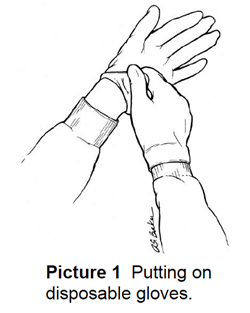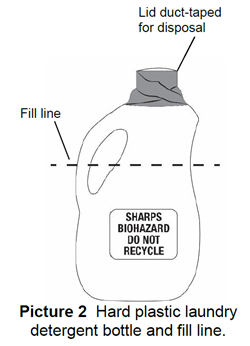Medicine Safety - Chemotherapy

Chemotherapy (kee-mo-THER-a-pee), or chemo, is a powerful medicine used to destroy cancer cells or prevent cancer cells from growing. However, it can also damage healthy cells in things like bone marrow, hair, or intestines. This can cause treatment side effects.
How Chemotherapy Is Given
- Chemotherapy can come in many different forms. These include:
- By mouth: pills, capsules, or liquid
- Intravenous (IV): into a vein and into the bloodstream
- Intramuscular (IM): into the muscle
- Subcutaneous (SQ): into “fatty” skin tissue just under the skin
- Intrathecal (IT): into the spinal fluid
- Chemo dose and schedule depends on your child’s height, weight, age, blood counts, and organ function.
- You will get a chemo calendar with the schedule of chemo medicines.
- Your doctor, provider, or pharmacist will explain how and when to take your chemo.
- Take these drugs exactly as told. Do not skip a dose without talking to your doctor.
- If you forget to take a dose, do not take double the dose the next time. Contact your doctor’s office or pharmacist to discuss what to do.
Possible Side Effects
Chemo affects everyone differently. Side effects can happen right away, be delayed, or last for a long time. Some side effects will require the chemo dose to be changed or delayed.
- Hair loss – This is common with chemo, but usually grows back after treatment.
- Nausea and vomiting – Medicines for nausea are given before, during, and after chemo.
- Lowered blood counts – Low blood counts can cause bruising, bleeding, infection, or feeling tired. Blood counts will be closely watched while getting chemo.
- Organ failure or injury, such as kidney, liver – Organ function will be watched closely during chemo treatment.
- Increased risk of infection, especially when blood counts are low
Drug Interactions
- Some medicines can have a bad effect when taken with chemo. Always talk to the doctor, health care provider, or pharmacist before starting new medicines while getting chemo.
- Vitamins, minerals, herbals, probiotics, and supplements can also interact with chemo or make it not work well. Always talk to the doctor, health care provider, or pharmacist first.
When to Call the Doctor
Call the doctor or health care provider if you have any new or worsening side effects, like:
- Cannot eat or drink
- Change in behavior or level of alertness
- Less pee (urine)
- New weakness in the face, arm, or leg
- Urinating less often
- Seizures, change in vision, or being very tired
- Uncontrolled vomiting
- Any stomach or back pain
- Fever, chills (shivering), or rash
- Leg pain, numbness, or tingling
- Severe or repeated headache
- Mouth or throat sores
- Jaw pain
- Sores on the buttocks
- Shortness of breath
- Signs of infection, bleeding, or anemia
- Uncontrolled pain
- Diarrhea or constipation
Ask the doctor, health care provider, or pharmacist if you have any questions.
Pregnancy and Breastfeeding
- Some chemo can affect a person’s ability to have children. Your treatment team will discuss the fertility options available to you.
- Both men and women should not become pregnant while getting chemo treatment. Ask the doctor or health care provider about birth control methods.
- Chemo can cause problems if taken during pregnancy. If a patient thinks they might be pregnant, tell the doctor before starting chemo or any medicine.
- Chemo can get into breast milk. A patient should discuss breastfeeding with the health care provider or doctor if they are getting chemo treatment.
- Chemo can be dangerous for caregivers who are pregnant. Tell your child’s doctor or health care provider if you are pregnant or could become pregnant.
Safety
- Your child should not get live vaccines (like chickenpox, measles, or polio) during and for 1 year after chemo. They can get the flu vaccine since the virus in the vaccine is not alive.
- Check with the doctor or health care provider before your child has any dental work. Tell your child’s dentist that they are getting chemo.
- Chemo can be absorbed through the skin or the lungs. When giving the child oral chemo or chemo injections at home, it’s important to follow the information below.
- Chemo can last in the blood and body fluids (urine, vomit, stool) for 48 hours after a dose. Wear disposable, nitrile gloves when helping the child use the bathroom, changing diapers, or if the child has vomiting. Wash your hands after.
Safe Handling of Chemo Medicines at Home
Some medicines, such as chemo, need special handling because they can be harmful (hazardous) to the people giving them. Studies show that people who care for patients taking these hazardous medicines can also have changes within their own body’s cells. Exposure to chemo can come from spills, splashes, breathing in chemo vapors or powder, and from coming in contact with the patient’s vomit, urine, or stool. These changes can be avoided.
The risk of danger from handling small amounts of these hazardous medicines is small, but it’s a good idea to avoid exposure if possible. Do the following to reduce your risk:
- You may need these supplies to handle chemo safely:

- Disposable gloves (Picture 1) – Get them from your local pharmacy or the Nationwide Children’s Hospital Homecare Retail Store.
- Disposable gown – if you are handling liquid chemo
- Household soap or detergent – any brand can be used
- Disposable towel – in case of spills
- Two-ply, heavy-duty trash bag – for used supplies
- Disposable plastic medicine cups and oral syringes
- Needle disposal or “sharps” container – needed if you are handling chemo given by needle or IV
- Wash your hands before and after handling hazardous medicines.
- Use a new pair of disposable gloves every time you touch any hazardous medicine.
- Use disposable plastic medicine cups to move a pill from a medicine bottle.
- Throw away any used gloves, gowns, medicine cups, oral syringes, or bottles in a two-ply, heavy-duty trash bag. Tie or seal the plastic bag and place it in your household trash bag. Be sure to keep this trash out of the reach of children and pets.
- If you are pregnant or trying to become pregnant, do not handle chemo medicines. If you are the only caregiver, speak to your doctor, health care provider, or pharmacist about safe ways to care for your child.
Handling Chemo at Home – Needles and Sharps
- Do not recap, bend, or break off the used needle.

- Do not remove the needle from the syringe.
- All sharps or needles must be thrown away in a safe sharps container. If you do not have a hospital-issued sharps container, use a container that is:
- Made of heavy-duty Use a laundry detergent bottle or liquid laundry softener bottle (Picture 2).
- Closed with a lid that screws shut. Needles should not be able to poke through the lid.
- Leak-proof and able to sit up and not fall over.
- Place the container in the middle of a full, heavy-duty trash bag. In the state of Ohio, you are allowed to put the trash bag out for regular trash pick-up. DO NOT put the container in the recycling.
- Ask your doctor or health care provider for more information about sharps containers.
Storing Hazardous Medicines
- Your pharmacist, doctor, or health care provider will tell you if there are any special storage instructions. Read the label on the prescription bottle carefully.
- Keep all drugs out of the reach of children or pets.
- Keep hazardous medicines separate from all other medicines.
- If the medicine needs to be refrigerated, keep it away from other foods. Use a separate bin in the refrigerator or place the medicine in a container.
- Keep the hazardous medicine in its original bottle or container. Do not place it in a pill box with other non-hazardous medicines.
Accidental Hazardous Spills
- If any of the chemo medicine spills:
- Put on a disposable gown and 2 pairs of gloves to clean it up.
- Cover the spill with a disposable towel and thoroughly wipe it up.
- Clean the area 3 times with a home cleaning product. This is to make sure that no medicine is left on the surface.
- Throw away all cleaning materials, gown, and gloves in a heavy-duty sealed trash bag. Put the bag in a trash can that is out of the reach of children and pets.
- Hazardous chemo medicines may irritate the skin. If chemo medicines are spilled on the skin, wash the area well with soap and water, then dry. If skin is red or irritated within 7 days, contact your doctor or health care provider.
- If the chemo gets in the eyes, rinse them with tap water for at least 15 minutes and call your doctor or health care provider.
HH-V-65 4/22 Copyright 2022, Nationwide Children's Hospital
